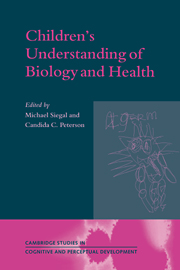1 - Becoming mindful of biology and health: an introduction
Published online by Cambridge University Press: 06 July 2010
Summary
Despite the large amount of investigation devoted to cognitive development, it has been only recently that attention has come to be directed to children's understanding of biology and health. The aim of this book is to provide a comprehensive view of the research that has been accomplished to date on development of children's biological understanding, its relevance to health issues, and applications in educational and legal settings, and to offer prospects for the future.
In this introduction, we examine alternative theoretical and methodological approaches to what children know in this vital area. First, we give a historical background in terms of the knowledge and beliefs about biology and health that were held by lay adults and health professionals in the nineteenth century. Such consideration leads to the conclusion that magic and religion as well as science retain prominent roles in the explanation of illness. In this respect, three contemporary research orientations – Piagetian, naive theory and conceptual change, and adaptive-evolutionary – are discussed in terms of predictions for what children can and do know about the mind–body distinction, processes of birth and death, illness transmission, food selection, pain, and the nature of disease prevention and cure. We then turn to considering the extent to which the predictions generated by these orientations differ from adults' expectations of what children can and do know, and how different types of methodologies may reveal the extent of children's knowledge.
- Type
- Chapter
- Information
- Children's Understanding of Biology and Health , pp. 1 - 20Publisher: Cambridge University PressPrint publication year: 1999
- 9
- Cited by



